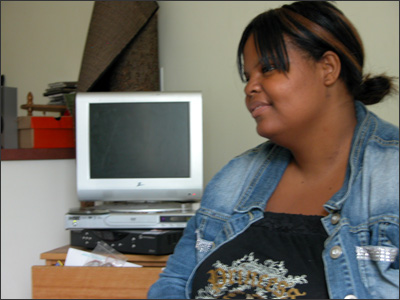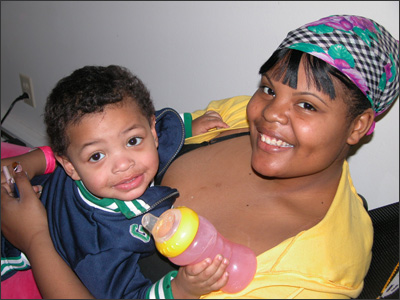|


Ty always dreamed of having her own home. She bounced through so many foster homes and institutions, she lost count. - Photo by Ellen Guettler
Tyondra Newton always dreamed of having a home of her own. As she opens the door to her new apartment, her cheeks give way to deep dimples. She can't stop grinning. It's just a single room, with a bathroom. But it's hers.
"I have my own apartment," she says with a giggle. She says it again, as if she can't quite believe it herself. "My own apartment!"
Tyondra is 19. Her nickname, "Ty," is tattooed on her neck in curly script. Her very own apartment is at Seventh Landing in St. Paul, Minnesota. It's permanent housing for young people who have been homeless. Most of the tenants have aged out of foster care, including Ty. She spent her whole life in foster care. She lived in so many homes and institutions, she lost count.
Ty has some family. She knew her mother growing up, and longed to be with her. But her mother was addicted to drugs. Ty and her two sisters were removed from her home. For years the three girls only had each other. But as they got older, it got harder to find homes where they could be together. As a teenager Ty started to pick fights with other kids and was sent to live at a residential treatment facility. She saw her sisters less and less.
When Ty turned 18, she was considered an adult in the eyes of the county. She had no one to pay for her care. She had aged out. Ty walked out of residential treatment and into a homeless shelter. She stayed in shelters for the first year on her own. And in one of them she met a girl named Jamah Boward. Jamah is an orphan; her family was killed in Liberia.
The two girls with no one else clung to each other. At night they usually stayed at the same youth shelter-- until one night when their options ran out.
"We had absolutely nowhere to go," Ty remembers. "[I] called almost every shelter. They were all full for our ages. I knew it was getting dark and I knew I didn't have no place to stay."
It was summer and Jamah had a job selling concessions at the local baseball field. She remembers getting off work in the evening and finding Ty at a bus stop.
"She was crying," Jamah says. "She told me she had nowhere to go."

When Ty aged out, she had nowhere to go. She spent nights sleeping on the roof of a building. It overlooked the playground she spent time in as a child.
Photo by Ellen Guettler
Jamah told her not to cry. They would figure something out. She called a social worker at one of the shelters that was full. The worker had already spent the day looking for a place the girls could stay. But staff aren't allowed to take young people into their homes. Ty remembered a low-roofed building in a local park. It overlooked a playground she would go to as a child. The girls asked the worker to meet them there. The worker arrived, gave them some blankets and drove away.
Ty and Jamah climbed up on the flat black-tarred roof. It was just one story high. Some trees growing in front of the building barely concealed them. They hoped they wouldn't be caught trespassing. They hoped the men who walked through the park wouldn't see them.
It was hot and dark. As they went to sleep, Jamah and Ty covered themselves with the blankets to ward off the summer mosquitoes.
Ty felt like she had hit rock bottom.
"When I was little, I saw people sleeping on the street and I didn't understand," she recalls. "And when I stayed in shelters I knew I was homeless. But when I had to sleep outside, I felt like my life was over. I was nobody."
Having a friend like Jamah was one of the few things that helped Ty feel less alone. They spent several nights on that roof. They forged a bond there they don't share with anyone else. Later that summer, they found beds once again in a shelter. Ty found out about Seventh Landing and put her name on the waiting list.
By winter, she finally has a place to call her own. Jamah has her own place too, not too far away.
But they keep a memento of the nights when they only had each other. They still have the blanket they used up on the roof. They trade off who keeps it. Ty says it's not very pretty to look at, and some of their friends make fun of it. But those friends don't understand what it symbolizes for Ty and Jamah.
"That blanket is like memories for our success," Ty says. "Because this blanket helped us get through nights when we didn't have what we have now."
Now Ty feels like she's piecing together a bit of a future. She pays 30 percent of her income in rent at Seventh Landing. The rest is federally subsidized through Section 8 housing vouchers. At Seventh Landing there's always a waiting list, but now that Ty is in, she can live here as long as she wants to. There's a coffee shop downstairs that employs tenants. And Ty spends part of her week working there. She's even gotten her nursing assistant certificate and is starting another part-time job at a phone company.
"That's three part-time jobs," Ty says proudly. "Back then I had none."
Ty wants to become a full-time registered nurse. The staff at Seventh Landing will help her enroll in classes in the fall.
But her jobs and the apartment haven't helped ease Ty's longing for a family. Her mother passed away a couple of years ago, around the same time Ty met her father. But he's in prison.
Ty's sisters live nearby. But they haven't fared much better than Ty herself. They're struggling to piece together their own lives.
And so Ty tries to help her sisters whenever she can. Now that she's found some stability, she gives them money for groceries. She takes her small nieces and nephews to McDonald's Playland, and baby-sits them whenever she can.
In July, for her twentieth birthday, Ty throws herself a party at Seventh Landing. Her sisters are there. They sit on folding chairs playing cards. They joke and shout at one another about cheating or being too competitive. Their laughter carries out to the patio where Ty's nieces and nephews run around with water balloons. It's been a year since those nights on the roof. Ty can't remember when she's had this much family in one place. She hasn't had a birthday party since she was eight years old. She takes a moment to look at everyone who has gathered in her honor. Her face is beaming.

Ty takes care of her cousin's child, Miguel. After growing up alone, she wants to keep her family together. - Photo by Ellen Guettler
A few months later, Ty is in her apartment playing with a little boy named Miguel. He's the child of a cousin, and his parents aren't taking care of him. Ty's still working multiple jobs, but she takes Miguel whenever she can, sometimes for days at a time. Ty can't bear the thought of the little boy going into foster care.
"I'm not saying that all foster homes are bad, but all of the ones I've been to have been," Ty says, as Miguel toddles over to her and pats her knees. "If Miguel stays there… I'm just afraid of anyone going into foster care, I don't want that ever to happen."
Ty's frustrated that Miguel's parents won't look after him. She thinks they have no idea how hard it is to grow up alone.
"They grew up all their life with their mom and dad," Ty says. "So they really don't understand what it's like to not have a mom and dad."
Ty wants to take care of Miguel until his parents come around. But the rules at Seventh Landing say she has to live alone in her apartment. So Miguel can't move in with her.
Ty knows that if she leaves Seventh Landing, she'll also be leaving a lot of the support that has helped her stay off the street. She'll still qualify for Section 8, and she can get subsidies for another apartment. But Seventh Landing offers her help finding a job or enrolling in school. The biggest reason young people leave Seventh Landing is because they've violated its strict policy against drugs and alcohol. But Ty's reason is family. She wants to move somewhere where she and Miguel can be together.
Ty decides not to take the nursing classes she'd planned in the fall. Instead she keeps working so she can afford a larger apartment. But once she moves away from Seventh Landing, she'll have no one to fall back on. Ty's sisters and her friend Jamah care about her, but they're busy with their own chaotic lives.
When we check back with Ty eight months later to see how she's doing, she's in good spirits, but she's dealing with some heavy burdens most people her age don't face alone.
She's still taking care of Miguel. He stays with her for weeks at a time. He's 2 years old now, roly-poly and talkative. Ty says she's happy he can tell her when he's hungry. She supports herself and Miguel by working at a local college cafeteria. But she doesn't have work when the college goes on break.
Ty has lived in two apartments since leaving Seventh Landing. And she was pregnant. She hadn't planned on the pregnancy, but she was excited when she found out she was having twins. But then, after six months, there were serious complications and she lost the babies.
Ty is still with the father. But she says he's hit her in the past. Ty has spent her childhood trying to get away from abuse, so she's not quite sure what's kept her from walking away from him.
These are typical challenges for young people who age out of foster care. Their housing tends to be unstable. They often struggle to stay employed. The young women are more likely than their peers to become pregnant. They're more likely to face abuse.
But Ty shares another characteristic with young people who age out of foster care: They tend to be optimistic about their futures. Her friend Jamah lives down the street. She spends time with her sisters. And she still hopes someday to have children of her own.
"I will raise my family totally different from how my family was raised," Ty says. "I want us to be a family. I want us all to be together."
Back to Wanted: Parents
| 


